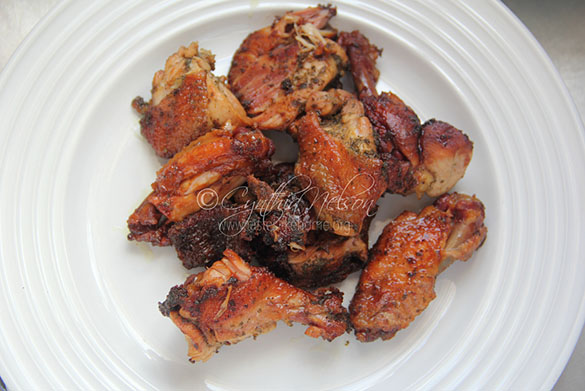We are still in the season of the holidays with the Twelfth Night of Christmas being tomorrow. That means I can sneak in something about Christmas food. We all know about that famous beloved Christmas dish Garlic Pork, but have you ever had Garlic Chicken? I had it for the first time this year and let me tell you – it’s a thing and it is very real.
During the lead-up to Christmas 2018, a few Guyanese friends were lighting up social media with their Garlic Chicken exploits – testing, pickling, cooking and sharing, albeit virtually. This past Christmas I decided to give it a try. I consulted a couple of the cooks and a friend who said that her mom always made Garlic Chicken at Christmas time. My main questions had to do with the period of time needed for the chicken to be cured and whether the meat can or should be bone-in or boneless. The answers varied on the length of time to pickle the meat based on personal preferences. However, responding on tested results, people opted for boneless rather than bone-in chicken. Two reasons stood out – the bones were soft and had an aftertaste owing to the pickling liquid perhaps not adequately penetrating them. Armed with some information and my experience with making Garlic Pork, I set about making Garlic Chicken.
Pork is obviously a tougher meat than chicken so immediately that meant the curing/pickling process would be shorter. I opted for 4 days based on the advice of a couple of friends; another friend had recommended 2 days, but I felt that time was too short. For the chicken itself, I de-boned a couple of thighs leaving the skin on and used a couple of whole bone-in wings, separating the flap from the drumette; the tips were discarded. The rest of the process was the same as making Garlic Pork – make a paste of fresh thyme, garlic and hot pepper, and generously rub the meat with the paste. For the curing liquid, I used 1-part white distilled vinegar to 1-part water and seasoned the mixture with salt to taste.
Into a clean jar went the thyme-garlic-pepper-rubbed chicken, and then the vinegar concoction was poured over it, until it covered the meat. A wooden spoon was used to gently make way for the liquid to go right down to the bottom of the jar. Given that the wings had bones, they were at the bottom of the jar with the boneless pieces of thighs at the top. After the first 24 hours and every subsequent period, I lifted the jar and gave it a few spins to ensure things were mixing properly. And on the 4th day, the jar was opened. The savoury aromatic scent of thyme, garlic and pepper said it was Christmas. I was excited.
Now, one of the things I was told by everyone who had made the Garlic Chicken was not to leave it in the brine for days after it had been cured (unlike Garlic Pork). The chicken would not only be over cured, but it would become bracingly acidic. The advice was to cook what was needed and freeze the remainder to cook at another time. Given that I had made a small batch, I cooked all of my Garlic Chicken at one time.
Once removed from the pickling liquid, I drained the meat on kitchen paper towels and lightly pat the pieces dry. A little oil was put to generously coat the bottom of a cast iron skillet and placed over medium-high heat. When the oil was hot, the meat was placed skin-side down to cook until brown on one side (5 minutes, covered) and then flipped and cooked on the other side for another 5 minutes, covered. I added ¾ cup of water to the pan to cook the meat, covered the pan and cooked it on medium heat for 5 minutes, then reduced the heat to low and cooked it until all the liquid evaporated (still covered). The result was chicken with an amazing brown crust with skin that was a little sticky with crisp edges, all absolutely delicious.
If you have ever eaten Garlic Pork, I do not need to tell you how tasty a dish it is, but I am telling you here today, a well-made Garlic Chicken could stand proudly and confidently alongside Garlic Pork. I am definitely making this dish again and not only at Christmas. It’s great for entertaining and serving as cutters. I ate some of mine as is, and then sandwiched some between a homemade bread roll.
A few things to note
● If using bone-in chicken, use only the wings, the bones from the thighs and drumsticks are larger and would need more time to cure; this can cause the meat to become too acidic having to stay longer in the pickling liquid. Besides, those larger bones have large amounts of marrow and I believe that was what was giving the aftertaste for one of my friends because she had chopped the meat with bone to cure it.
● I highly recommend using skin-on, boneless chicken thighs for Garlic Chicken, if you can get the drumsticks, skin-on and boneless, those would work perfectly too. This year, I know a couple of people opted to use chicken breast, I am yet to hear the results. However, I would personally stay away from chicken breasts as the meat is too lean. Also, if using chicken breasts, I would consider only curing for 2 days and cutting the meat into large chunks so that it does not dry out too much when cooking.
● Only use fresh meat for Garlic Chicken, just as you would with Garlic Pork, in other words, do not use meat that you’ve had frozen and defrosted.
If you have the time and are curious, definitely try making some Garlic Chicken. I think you’d be very pleased.
Cynthia
cynthia@tasteslikehome.org











